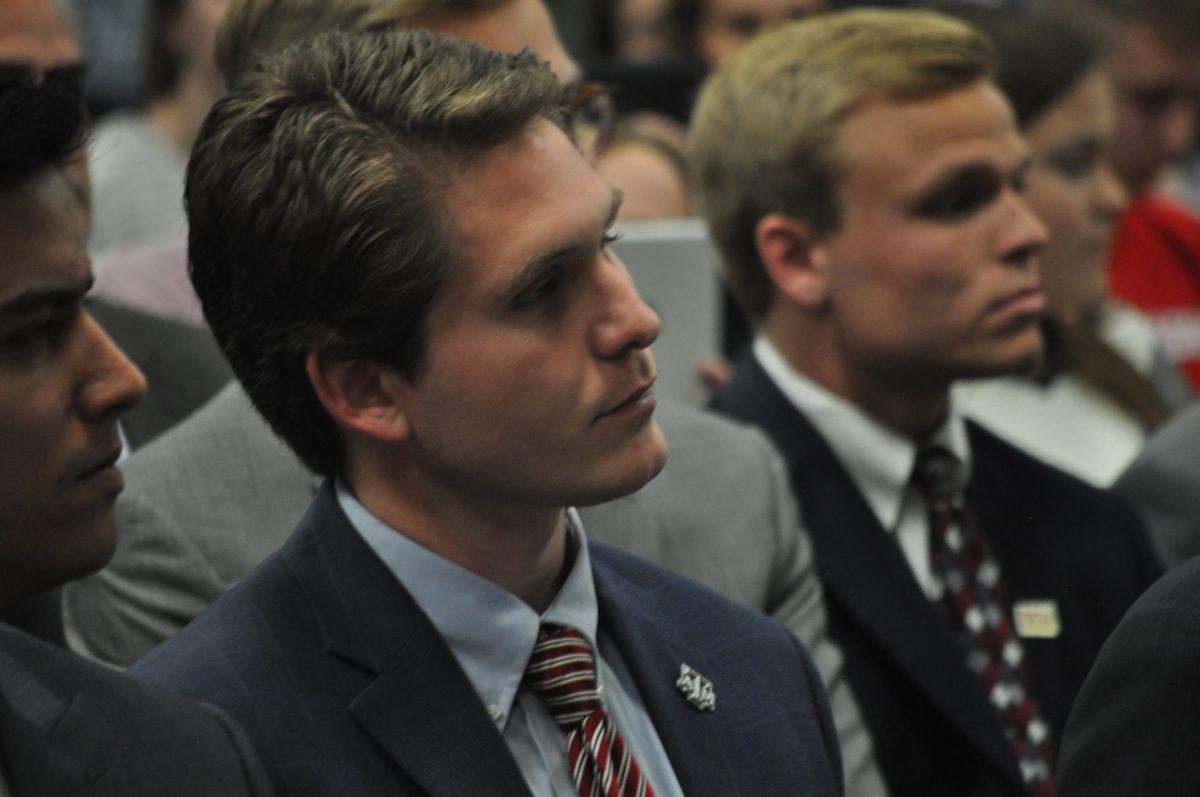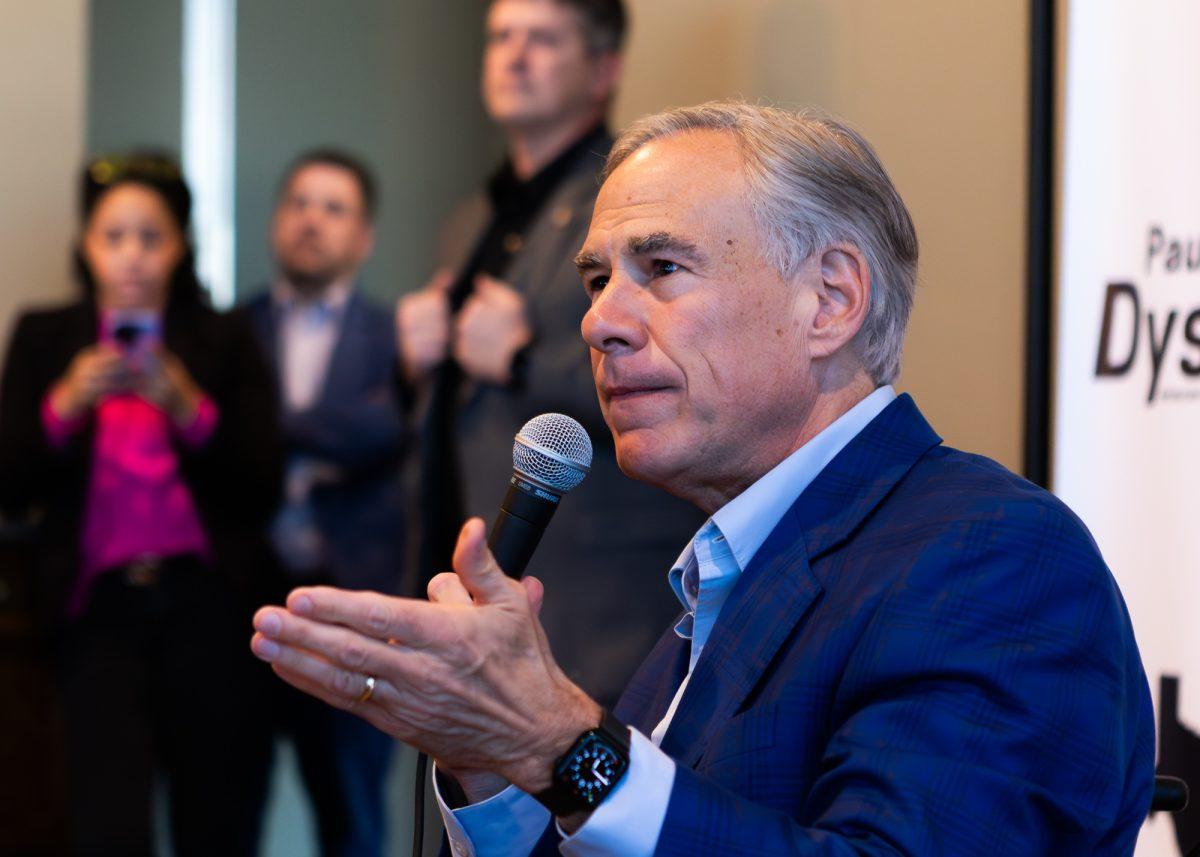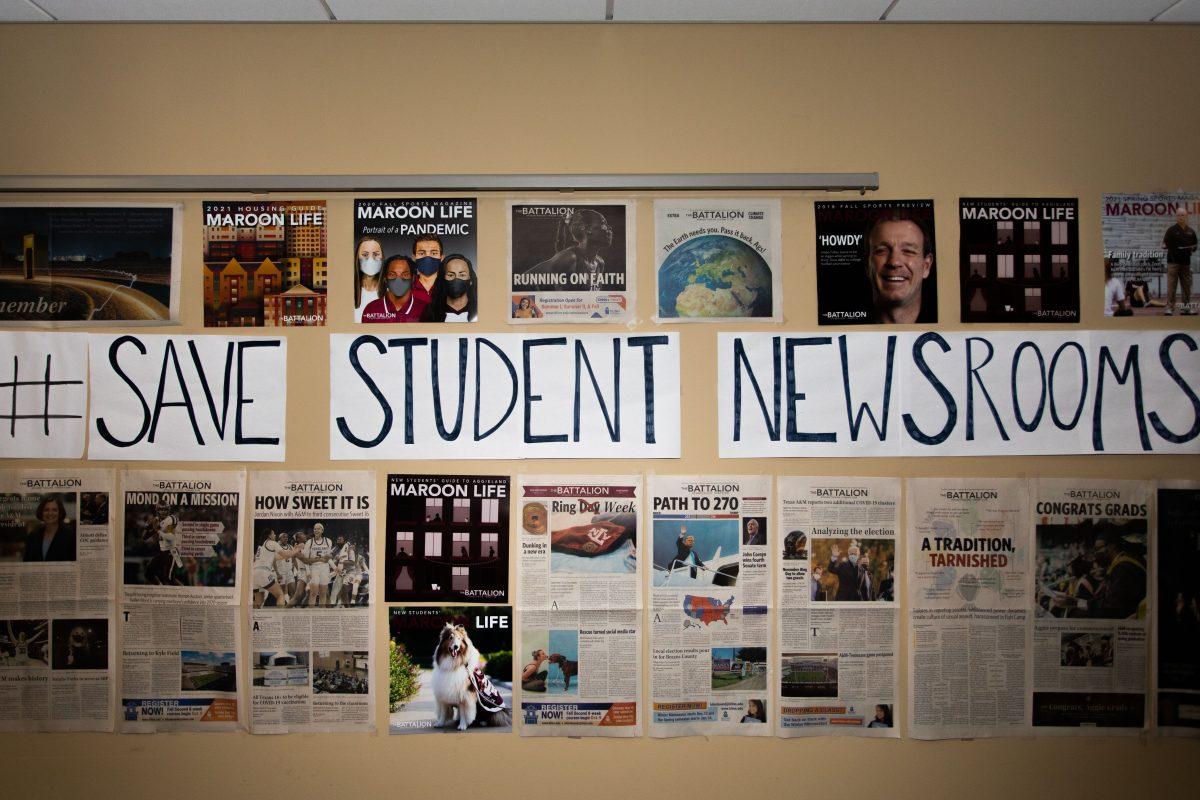The Texas A&M Student Government Association’s public hearing for disqualified student body president candidate Robert McIntosh, who is contesting his disqualification, was held Thursday night in the Koldus Building.
The hearing comes after a pretrial hearing held Wednesday evening, which dealt primarily with the body of evidence submitted to the Court. After a two hours, the SGA court announced that they have moved to closed deliberations with no estimated time frame for a final decision. When results are finalized, they will be posted outside the student government office in Koldus room 126 and the SGA Judicial Court website.
After initially winning the SBP race, McIntosh was disqualified for two violations. The first included 14 counts of voter intimidation, and the second was failure to report a campaign expense. The voter intimidation charges were filed under case 69-01, and the expense report was under 69-02.
Before the hearing business honors junior and chief justice of the SGA Judicial Court Shelby James said the court will have some restrictions on evidence presented.
“The Court voted on the parties’ evidence and choose to keep the majority of submissions,” James said. “In proceeding with case 69-01, a few pieces of evidence will not be allowed in oral arguments after the plaintiff argued his concerns during the pre-trial hearing.”
Only case 69-01, regarding the charges of voter intimidation, were discussed as 69-02, the expense report violation, is a separate offense, and would be handled by a separate trial in the event that voter intimidation charges are dismissed.
Business honors senior and election commissioner Rachel Keathley began her opening argument by saying this case was not an attack on McIntosh or his character.
“While we contend this was not done maliciously, [the violations] still violate the SGA code,” Keathley said.
Keathley also said there was no single piece of evidence which led to her decision to disqualify McIntosh.
“It was not one piece of evidence alone. It was the overall evidence that led us to choose to disqualify him,” Keathley said.
During her argument, Keathley said the violation wasn’t that McIntosh and his campaign were talking to students during campaigning hours, but the fact they were encouraging voters to cast their ballot on the spot.
“Our concern was the plaintiff was specifically asking students to vote while they watched,” Keathley said. “It’s the prompting we are concerned about.”
While one of McIntosh’s campaign’s arguments against the violations was that many of them were reported anonymously, Keathley said the anonymity was granted for good reason.
“People that were victims of this were not aware of the election regulations and would like to remain anonymous, for fear of backlash,” Keathley said.
During the hearing McIntosh and his campaign called forth their witnesses, with McIntosh himself being the first to take the stand.
“What I can say is I know for certain there was no coercion,” McIntosh said. “We just humbly asked for their vote. More often than not I was standing by my sign saying ‘Howdy,’ sometimes ‘Howdy have you voted yet?’ If they did I shook their hand and thanked them for voting. If they didn’t I introduced myself and humbly asked for their vote.”
McIntosh said he himself never followed anyone as he has been accused of doing, and believes none of his campaign staffers did either.
“We did not follow a single person,” McIntosh said. “We asked if we could walk with them. We wanted to genuinely interact with people and we succeeded in that. I said [to my staff] to greet [students] and humbly ask for their vote.”
McIntosh testified that he does not believe asking student for their vote is wrong, or that it is coercion.
“I genuinely don’t believe that any person felt harassed,” McIntosh said. “I don’t think that there’s anything wrong with intending to persuade someone.”
Class of ‘15, and 2014-2015 Student Body President Kyle Kelly also testified on McIntosh’s behalf. During his cross examination, Kelly said he did not believe the actions of McIntosh’s campaign should be considered coercion.
“Part of why I am here is to provide context for what you’re bringing forward,” Kelly said. “It was not forced. The definition of coercion is not what happened here. They were being friendly. I have no problem not being on campus [during the time the violations took place]. I am here to give testimony for Robert, whatever difference that makes.”
Despite having called two witnesses to testify during Wednesday’s pre-trial hearing, Keathley did not bring forth any witnesses for her defense.
“We brought forth two witnesses last night that were part of our evidence and we did not feel the need to call anyone to address the disputed portions of [the evidence],” Keathley said. “The witnesses last night were enough, so we didn’t need any character witnesses on my behalf. It shouldn’t affect the court’s ruling.”
James said she feels the results of the case could be divisive for both members of student government and the student body as a whole.
“This is a high-stakes event for many people, so I can imagine that the Court will have disappointed supporters on either side of the race,” James said.
James said the student body needs to remember the hearing was not about the candidates but the violations which were committed.
“The vote of the court is not one in favor of one candidate or the other; it is addressing a major violation in light of the Election Regulations and ruling as we are bound by the Student Government Code,” James said.









